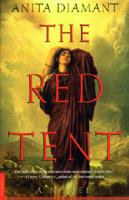Anita Diamant's The Red Tent has long been a reading group favorite. BookClubGirl.com's Jennifer Hart shares why, years after reading it, she still vividly recalls her group's discussion of the Biblical-themed novel.
I've found out something in my book group --- the books I often most enjoy reading don't necessarily engender the greatest discussion. And books that on an initial reading I might not love can sometimes generate the most enlightening and engaging discussions. The biggest example of this phenomenon as I've experienced it was reading Anita Diamant's The Red Tent.
Don't get me wrong --- I enjoyed reading the book and learning about the history of Dinah and her story as told by Diamant. But as I was reading it, I remember thinking, I'm not sure if we'll have enough to talk about here. How wrong I was. Our group quickly got into talking about the rites of passage that young women in that time experienced. While obviously the lives of women are better now, many of us mourned that in our time (excepting bat mitzvahs and quincineras) there really isn't a universal cultural celebration of a girl's passage into adulthood. (I don't count the overly commercialized "sweet sixteen").
Diamant admits that what went on in the red tent is her invention, and while we definitely balked at the idea of being removed from the community on a monthly basis, we found ourselves imagining the luxury that this could afford and we appreciated the time that women were allotted to be on their own just in the company of other women. This led to discussing our roles as daughters and our (at that time) eventual roles as mothers of daughters and how we might approach celebrating our own daughters' growing up, as opposed to what we may have experienced.
I have never forgotten that discussion, though it took place probably more than ten years ago, and I've applied things we discussed that night in my relationship with my daughters. It's made me recommend The Red Tent over and over again --- something I would not have done if I'd just read the book on my own. And isn't that what book groups are meant to do in the first place --- help us gain a greater understanding and appreciation of the books we read and by extension, ourselves?
---Jennifer Hart
Don't get me wrong --- I enjoyed reading the book and learning about the history of Dinah and her story as told by Diamant. But as I was reading it, I remember thinking, I'm not sure if we'll have enough to talk about here. How wrong I was. Our group quickly got into talking about the rites of passage that young women in that time experienced. While obviously the lives of women are better now, many of us mourned that in our time (excepting bat mitzvahs and quincineras) there really isn't a universal cultural celebration of a girl's passage into adulthood. (I don't count the overly commercialized "sweet sixteen").
Diamant admits that what went on in the red tent is her invention, and while we definitely balked at the idea of being removed from the community on a monthly basis, we found ourselves imagining the luxury that this could afford and we appreciated the time that women were allotted to be on their own just in the company of other women. This led to discussing our roles as daughters and our (at that time) eventual roles as mothers of daughters and how we might approach celebrating our own daughters' growing up, as opposed to what we may have experienced.
I have never forgotten that discussion, though it took place probably more than ten years ago, and I've applied things we discussed that night in my relationship with my daughters. It's made me recommend The Red Tent over and over again --- something I would not have done if I'd just read the book on my own. And isn't that what book groups are meant to do in the first place --- help us gain a greater understanding and appreciation of the books we read and by extension, ourselves?
---Jennifer Hart


